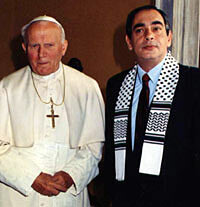The Guardian 19 April 2004

Pope John Paul II and Afif Safieh, General Delegate to the UK and the Holy See.
The study of American-Israeli relations has preoccupied two generations of scholars. Two competing schools of thought addressed the “who wags whom” debate. The first school spoke of “an American Israel”, with the United States dictating to the local ally its regional policy in accordance with the American global vision. Noam Chomsky wrote two decades ago that Washington was the contemporary Rome and Israel its regional belligerent, Sparta.
The second school projects the image of “an Israeli America”, a complex relationship where the global superpower adopts the regional policy of its client state and integrates it in its global strategy. This is seen as a result of a powerful pro-Israel lobby that succeeded in turning “Capitol Hill into another Israeli-occupied territory”.
I have always believed that both schools of thought were correct but at different moments in history, depending on the strength of the American president, how comfortable he is in the country and in Congress, and how comfortable the US is in the world.
After the horror of 9/11, when the predictable retaliation was being discussed, the pro-Israel lobby emerged as the “maximalist school”, which wanted to expand the theatre of operations beyond Afghanistan to engulf Iraq, Syria and Libya. That lobby has grown accustomed to using one muscle too many and one pressure too far.
The collusion between the US and Israeli agendas has put America on a collision course with the Arab World, which now perceives the US as Israel’s belligerent Sparta and the aim of American foreign policy to be docility, not democracy.
Tony Blair has always had a more sophisticated approach than George Bush. Blair knew that military challenges and security threats needed political responses. That to win the battle of hearts and minds, the west had to be seen as engaged in resolving the Palestinian problem. The test and the extent of his influence in Washington depended on who Bush needed more: Blair internationally or Ariel Sharon domestically.
Last week was a sad moment for international diplomacy. The world’s two most powerful leaders, Bush and Blair, caved in to the most unscrupulous politician in the Middle East, who was found to be “unfit for public office” by an Israeli inquiry committee after the massacres of Sabra and Shatila in 1982.
Sharon is not hiding his game. In a recent interview with the leading Israeli journalist Nahum Barnea, he said Israelis should see his plan of unilateral disengagement from the Gaza Strip not as a reward but as a punishment of the Palestinians. He announced that the Palestinians could operate neither a port nor an airport in Gaza, and that Israel intended to keep control of territorial water and airspace. Nor would they have control of the borders. He added that this would delay the discussion of a Palestinian state for many years. He forgot to mention was that Gaza, with its 1.3 million inhabitants, is only about 1% of historic Palestine.
Why Bush considered Sharon’s intentions “courageous” and “a golden opportunity” can be explained by the electoral considerations of an embattled president. But I remain puzzled by Blair’s enthusiasm for Sharon’s machinations and his conviction that they are in harmony with the road map. He has more experience in power than Bush, is better advised, and electoral considerations in Britain run in the opposite direction. Opinion polls show a 2-1 ratio in favour of Palestinian aspirations as compared with the Israeli position. Debates in parliament, across the political divide, should encourage him to be more assertive. All indicationsshow that, on Palestine/Israel, Blair does not reflect the depth of feeling in Britain.
Sharon has been dealing with the US and Britain as though they were his own banana republics. To his intransigence they constantly respond with abdication of responsibility and self inflicted impotence. The way ahead under the road map would have been to secure a reciprocal cessation of violence that all Palestinian factions accept; pressure Sharon to couple a complete withdrawal from Gaza with a pull-out of the urban centres in the West Bank to allow the creation of a Palestinian state “with temporary frontiers”; and to make Palestinian elections possible - presidential, parliamentary and municipal - and pave the way for final-status negotiations.
None of that has been undertaken. Bush and Blair are allowing Israel to dictate what is possible. Sharon will pursue his policy of politicide, vandalising Palestinian society and the economy, and crushing any national representation and government. Despite Hamas’s self-restraint since the assassination of Sheikh Yassin and its dialogue with other factions to minimise civilian deaths on both sides, he has pressed ahead with decapitating the Palestinian leadership by killing Abdul-Aziz Rantissi.
For years it has been my belief that the ideal US president for Middle East peace would be one who had the ethics of a Carter, the popularity of a Reagan and the strategic audacity of a Nixon. Alas, we have a president who has the ethics of a Nixon, the popularity of a Carter and the intellectual agility of a Reagan.
Afif Safieh is the Palestinian General Delegate to the United Kingdom and the Holy See. Website: www.palestinianuk.org. This article first appeared in The Guardian of Monday April 19, 2004 and is reprinted with the author’s permission.
Related Links

